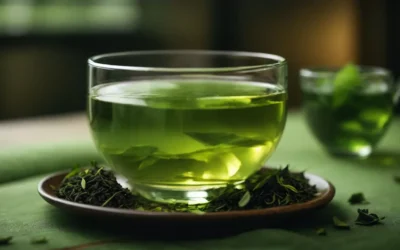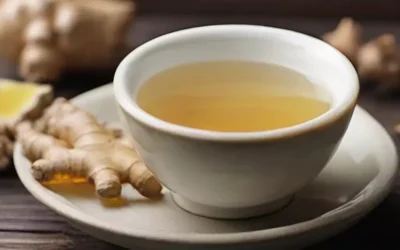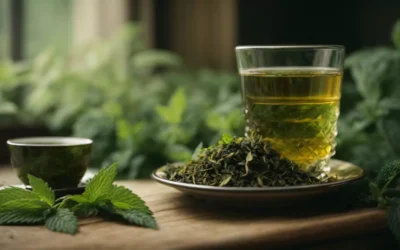Peppermint tea, a refreshing and aromatic herbal drink, has been enjoyed for centuries for its soothing taste and numerous health benefits. The spearmint essential oil used in this aromatherapy beverage adds an extra layer of relaxation and wellness. Tracing its origins back to ancient Egypt and Greece, this delightful spearmint tea has stood the test of time. Its aromatherapy benefits and soothing effects on the temples make it a refreshing drink.
Research and studies have shown that peppermint tea, along with spearmint, can aid in digestion, alleviate symptoms of IBS (Irritable Bowel Syndrome), and provide relief from various digestive issues. Additionally, the use of peppermint and spearmint in aromatherapy has been found to have potential medicinal benefits for pain management.
The intense aroma of peppermint, along with its popular choice among people seeking natural remedies for pain, nausea, and ailments, adds to its appeal.
- Exploring Peppermint Tea
- Health Benefits of Peppermint Tea
- Brewing the Perfect Cup of Peppermint Tea
- Nutritional Profile of Peppermint Tea
- Peppermint Tea as a Digestive Aid
- The Calming Effects of Peppermint on the Body
- Peppermint Tea’s Role in Mental Clarity and Alertness
- Selecting High-Quality Peppermint Tea
- Understanding the Limits: Side Effects and Cautions
- Other Alternative Teas with Health Benefits
- Conclusion
- FAQs
Exploring Peppermint Tea
Versatile Herb: Derived from the Mentha piperita Plant
Peppermint tea is a popular beverage derived from the extract of the Mentha piperita plant. It is known for its potential to relieve pain, according to research. This versatile herb, known for its refreshing taste and numerous health benefits, has been used for centuries. Mint tea, made from peppermint extracts, is particularly popular for its soothing properties. Whether enjoyed on its own or combined with black tea, mint tea can help alleviate pain and provide a refreshing beverage option. Peppermint extracts and oil are known for their distinct aroma and flavor, making them favorites among tea enthusiasts. Studies have shown that peppermint extracts can help alleviate pain.
Distinctive Flavor Profile: A Harmonious Blend of Minty and Cooling Notes
One of the key attractions of peppermint tea is its unique flavor profile, which is derived from the extract of peppermint oil. Additionally, a recent study has shown that peppermint oil can help alleviate pain. Peppermint extract offers a harmonious blend of minty and cooling notes, providing a refreshing experience with every sip. This is supported by numerous studies that have examined the benefits of peppermint oil. The strong menthol content in peppermint oil extract gives it a cooling sensation, making it an ideal choice for those hot summer days or when you need a pick-me-up, according to various studies.
Widely Available: Found in Tea Bags, Loose Leaf, or Fresh Leaves for Infusion
Peppermint tea, known for its refreshing flavor, can be easily accessed in various forms such as tea bags, loose leaf, or fresh leaves for infusion. Numerous studies have been conducted on the benefits of peppermint oil, revealing its potential health advantages. Tea bags are convenient and easy to use, allowing you to enjoy a cup of peppermint tea without any hassle. Moreover, numerous oil studies have shown the benefits of peppermint oil for relaxation and digestion.
Loose-leaf mint tea options provide more flexibility in terms of adjusting the strength and flavor according to your preference. Peppermint extract, study, and oil can enhance the taste. If you prefer a more authentic experience, using fresh peppermint leaves for infusion allows you to savor the natural essence of this herb. Adding a few drops of peppermint oil to the infusion can enhance the flavor and provide additional benefits. A recent study has shown that peppermint oil has potential therapeutic properties.
There are several ways to prepare peppermint extract, mint tea, and oil based on personal preference. You can steep the tea bag or loose leaves in hot water with peppermint extract or oil for about 5-7 minutes before straining and enjoying the brew. Alternatively, you can also opt for cold brewing by steeping the peppermint leaves overnight in cold water to create a refreshing iced version. Additionally, you can enhance the flavor by adding a few drops of peppermint extract or oil.
Peppermint oil extracts are another option if you want to add some minty goodness to your beverages or culinary creations. These peppermint extracts are concentrated forms of oil, allowing you to enhance the flavor in various recipes such as desserts, cocktails, or even homemade beauty products.
Peppermint contains essential oils that are rich in rosmarinic acid, which has been linked to several health benefits. Mint oil is known for its soothing properties and can help alleviate digestive issues like bloating and indigestion. Peppermint oil tea may also provide relief from headaches and sinus congestion due to its natural cooling effect.
Health Benefits of Peppermint Tea
Peppermint tea, infused with the natural oils of peppermint, is a flavorful beverage that offers a range of potential health benefits. The oil in peppermint tea can positively impact your well-being. Let’s explore some of the ways this aromatic herbal tea, infused with essential oils, can support your health.
Digestive Aid
If you’ve ever experienced indigestion, bloating, or stomach discomfort, peppermint oil tea may provide relief. The natural compounds found in peppermint oil have been shown to relax the muscles in the gastrointestinal tract, helping to soothe digestive issues. Sipping on a warm cup of peppermint tea after a meal can help ease discomfort and promote healthy digestion. Peppermint oil is known for its soothing properties and can aid in digestion.
Natural Remedy for Headaches
When tension headaches strike, reaching for a cup of peppermint tea infused with essential oil might be just what you need. The menthol present in peppermint oil has muscle-relaxing properties that can help alleviate headache symptoms and promote relaxation. Instead of relying solely on over-the-counter pain relievers, consider sipping on some refreshing peppermint tea with a drop of oil to ease the tension in your head and unwind.
Immune Booster
Peppermint tea, enriched with oil, contains antioxidants that can give your immune system a much-needed boost. Antioxidants, including oil, combat free radicals in the body and reduce oxidative stress, protecting cells from damage. By incorporating peppermint tea into your daily routine, you can provide your body with an extra dose of these powerful antioxidants, supporting overall well-being and strengthening your immune system. Peppermint tea contains natural oil that helps boost antioxidant levels in the body.
Freshens Breath
Bad breath, also known as halitosis, can be embarrassing and affect our confidence in social situations. One possible cause of bad breath is the presence of oil-producing bacteria in the mouth. Luckily, sipping on some peppermint oil tea can help freshen up your breath naturally. Peppermint oil has natural antiseptic properties that combat bacteria responsible for causing bad breath. So next time you’re concerned about having fresh breath before an important meeting or date, consider enjoying a cup of invigorating peppermint tea infused with essential oil.
Peppermint tea offers numerous potential health benefits, from aiding digestion to boosting the immune system and providing natural relief for headaches. Additionally, the oil found in peppermint leaves has been shown to have various therapeutic properties. By incorporating this herbal tea into your daily routine, you can harness its therapeutic properties and support your overall well-being.
Brewing the Perfect Cup of Peppermint Tea
Simple Preparation Method
To brew a delicious cup of peppermint tea, all you need is 1 teaspoon of dried peppermint leaves and some hot water. Simply steep the leaves in the hot water for about 5 minutes. This simple method allows the flavors and aromas of the peppermint to infuse into the water, creating a soothing and refreshing beverage.
Enhancing the Flavor
If you want to add an extra twist to your peppermint tea, there are a couple of options to consider. One popular choice is adding a drizzle of honey. The natural sweetness of honey complements the minty flavor of the tea, creating a delightful combination that will tantalize your taste buds. Another option is squeezing a splash of lemon juice into your tea. The citrusy tang adds a refreshing zing to the herbal infusion.
Experiment with Steeping Time
The strength and intensity of peppermint tea can be adjusted by experimenting with steeping time. If you prefer a milder flavor, you can reduce the steeping time to around 3-4 minutes. On the other hand, if you want a stronger and more robust taste, extending the steeping time up to 7-8 minutes may be preferable. It’s all about finding what suits your personal preference.
It’s important to note that different individuals may have varying preferences. Some people may enjoy their tea on the milder side with just a hint of mintiness, while others may prefer a bolder flavor that really packs a punch.
Nutritional Profile of Peppermint Tea
Peppermint tea is not only a refreshing and soothing beverage, but it also offers several nutritional benefits. Let’s take a closer look at the nutritional profile of peppermint tea and how it can contribute to your overall health.
Zero calories and caffeine-free beverage option
If you’re looking for a guilt-free drink, peppermint tea is an excellent choice. It contains zero calories, making it a great alternative to sugary beverages. Whether you’re trying to maintain or lose weight, peppermint tea won’t derail your efforts. Plus, it’s naturally caffeine-free, so you can enjoy a cup any time of the day without worrying about disrupting your sleep patterns.
Contains essential minerals like calcium, potassium, and magnesium
Peppermint tea is packed with essential minerals that are beneficial for your body. Calcium is crucial for maintaining strong bones and teeth, while potassium helps regulate blood pressure and supports proper muscle function. Magnesium plays a vital role in numerous bodily functions, including nerve transmission and energy production. By enjoying a cup of peppermint tea regularly, you can help ensure that your body gets these important minerals.
Source of vitamins A and C, contributing to a healthy immune system
In addition to minerals, peppermint tea also contains vitamins A and C. Vitamin A is essential for maintaining good vision and promoting healthy skin. It also plays a crucial role in supporting the immune system by helping the body fight off infections. Vitamin C is well-known for its immune-boosting properties as well as its antioxidant effects that protect cells from damage caused by free radicals. Including peppermint tea in your diet can provide an extra boost to keep your immune system strong.
Peppermint tea offers more than just its refreshing flavor; it provides several nutritional benefits that support overall health. With zero calories and no caffeine content, it’s an ideal choice for those seeking a healthier beverage option. The essential minerals like calcium, potassium, and magnesium found in peppermint tea contribute to various bodily functions. The presence of vitamins A and C helps strengthen the immune system, promoting overall well-being.
Peppermint Tea as a Digestive Aid
Alleviates Symptoms of Irritable Bowel Syndrome (IBS)
Peppermint tea has been found to be effective in alleviating symptoms of irritable bowel syndrome (IBS). People with IBS often experience abdominal pain and bloating, which can be uncomfortable and disruptive to daily life. However, sipping on a warm cup of peppermint tea may provide some relief.
Promotes Smoother Digestion
One of the reasons peppermint tea is beneficial for digestion is its ability to relax gastrointestinal muscles. This relaxation helps promote smoother digestion and can help alleviate discomfort caused by an upset stomach or indigestion. By calming the muscles in the digestive tract, peppermint tea may help reduce spasms and cramping that can occur during digestion.
Soothes Nausea and Reduces Vomiting Sensations
Another benefit of peppermint tea is its ability to soothe nausea and reduce sensations of vomiting. Whether it’s due to motion sickness, morning sickness, or an upset stomach, feeling nauseous can be unpleasant. Sipping on a cup of peppermint tea can provide a soothing effect on the stomach and help alleviate feelings of nausea.
Peppermint tea’s antiemetic properties have been recognized for centuries, making it a popular choice for relieving queasiness. The refreshing aroma and taste of peppermint also contribute to its effectiveness in reducing vomiting sensations.
In addition to these benefits, peppermint tea has also been shown to provide relief for individuals suffering from gastroesophageal reflux disease (GERD). GERD is a condition characterized by acid reflux from the stomach into the esophagus, causing heartburn and discomfort. Peppermint tea helps relax the lower esophageal sphincter, allowing it to close properly and prevent acid from flowing back up into the esophagus.
The Calming Effects of Peppermint on the Body
Peppermint tea is not only delicious but also offers a range of benefits for your body and mind. But also other herbal teas like chamomile tea, dandelion tea, and nettle tea can have a calming effect on your overall well-being.
Soothes Muscle Tension with Menthol
One of the key components of peppermint tea is menthol, which provides a cooling sensation that can help soothe muscle tension. Whether you’ve been hitting the gym or sitting at a desk all day, peppermint tea can offer relief by relaxing those tight muscles. Sip on a warm cup of peppermint tea to experience its soothing effects and let your muscles unwind.
Alleviates Stress-Related Symptoms
Feeling stressed out? Peppermint tea might just be the answer! This aromatic beverage has been used for centuries in aromatherapy to promote relaxation and reduce anxiety. The natural compounds found in peppermint have a calming effect on the nervous system, helping to alleviate stress-related symptoms like anxiety or restlessness. So next time you’re feeling overwhelmed, reach for a cup of peppermint tea to find some much-needed tranquility.
Relieves Menstrual Cramps
Ladies, listen up! Peppermint tea can be your new best friend during that time of the month. The muscle relaxant properties of peppermint make it an excellent choice for relieving menstrual cramps. By relaxing the uterine muscles, this herbal infusion helps ease the pain and discomfort associated with menstruation. Say goodbye to those pesky cramps and hello to some much-needed relief by incorporating peppermint tea into your self-care routine.
Aids in Digestion
We mentioned in the previous section that peppermint tea is great for digestion, but did you know it can also help relieve nausea? If you’re feeling queasy or experiencing an upset stomach, sipping on some peppermint tea can provide relief. The natural compounds in peppermint have been shown to have a soothing effect on the digestive system, helping to calm an upset stomach and reduce feelings of nausea. So the next time you’re feeling a bit off, brew yourself a cup of peppermint tea and let it work its magic.
Soothes Headaches and Migraines
Headaches and migraines can be incredibly debilitating, but peppermint tea may offer some reprieve. The menthol in peppermint has been found to possess analgesic properties, which means it can help alleviate pain. Sipping on a warm cup of peppermint tea when you feel a headache coming on may help ease the discomfort and reduce the intensity of migraines.
Peppermint Tea’s Role in Mental Clarity and Alertness
Enhances Cognitive Function
Peppermint tea has been found to have a positive impact on cognitive function. It can improve focus, memory, and attention span. The natural compounds found in peppermint, such as menthol, have been shown to stimulate the brain and enhance mental clarity. Drinking peppermint tea regularly may help you stay sharp and focused throughout the day.
Invigorating Aroma
One of the reasons why peppermint tea is so effective in promoting mental alertness is its invigorating aroma. The scent of peppermint has been known to stimulate the senses and awaken the mind. Just taking a whiff of this refreshing scent can give you an instant boost of energy and help you feel more awake and alert.
Reduces Fatigue and Increases Energy Levels Naturally
If you often find yourself feeling tired or fatigued during the day, peppermint tea might be just what you need. It has natural energizing properties that can help combat fatigue and increase your energy levels without relying on caffeine or other stimulants. Peppermint tea provides a gentle pick-me-up that won’t leave you feeling jittery or experiencing a crash later on.
Peppermint tea contains no caffeine, making it an excellent choice for those who are sensitive to stimulants or trying to reduce their caffeine intake. Instead of relying on artificial energy drinks or sugary beverages, sipping on a cup of peppermint tea can provide a natural boost without any unwanted side effects.
Incorporating Peppermint Tea into Your Routine
To reap the benefits of peppermint tea for mental clarity and alertness, consider incorporating it into your daily routine. Brew a cup in the morning to start your day off with a burst of freshness or enjoy it as an afternoon pick-me-up when you need an extra dose of focus.
You can also experiment with adding other ingredients, such as lemon or honey, to enhance the flavor and potential benefits of your peppermint tea. Remember to steep the tea for about 5-7 minutes to extract the maximum amount of flavor and compounds.
Incorporating a mindfulness practice while sipping on your peppermint tea can further enhance its effects on mental clarity. Take a moment to slow down, breathe deeply, and fully immerse yourself in the experience of drinking your tea. Allow the refreshing aroma and taste to awaken your senses and bring you into a state of heightened awareness.
By making peppermint tea a regular part of your routine, you can harness its cognitive-enhancing properties and promote mental clarity and alertness naturally.
Selecting High-Quality Peppermint Tea
Organic or Pesticide-Free for Purity
One important factor to consider is whether it is organic or pesticide-free. Opting for organic peppermint tea ensures that the leaves have been grown without the use of harmful pesticides or chemicals. This guarantees a purer and more natural tea experience.
Loose Leaf Tea for Robust Flavor
If you’re looking to enhance your peppermint tea experience with a more robust flavor profile, choosing loose leaf tea is the way to go. Unlike pre-packaged tea bags, loose leaf teas consist of whole, intact leaves that retain their essential oils and flavors. When steeped in hot water, these leaves release their full aroma and taste, resulting in a richer and more satisfying cup of peppermint tea.
Proper Storage Conditions for Freshness
To ensure that your peppermint tea retains its freshness over time, it’s crucial to check for proper storage conditions when purchasing. Look for teas that are packaged in airtight containers or resealable bags. This helps to preserve the flavor and aroma of the tea by preventing exposure to air and moisture. Storing your peppermint tea in a cool and dark place away from direct sunlight will further extend its shelf life.
Understanding the Limits: Side Effects and Cautions
Allergic Reactions
Peppermint tea is generally safe for consumption, but it’s essential to be aware of potential side effects and caution. Some individuals may experience allergic reactions to peppermint. Allergies can manifest in various ways, such as skin rashes, itching, hives, or difficulty breathing. If you notice any of these symptoms after consuming peppermint tea, it’s crucial to discontinue its use and seek medical advice.
Pregnancy and Breastfeeding
If you’re pregnant or breastfeeding, it’s advisable to exercise caution when consuming peppermint tea. While there isn’t substantial evidence suggesting that moderate consumption is harmful during pregnancy or breastfeeding, excessive intake should be avoided. Peppermint has been known to relax the muscles in the uterus and may potentially affect hormone levels. It’s always wise to consult with your healthcare provider before incorporating peppermint tea into your routine during these periods.
Medical Conditions and Medications
If you have specific medical conditions or are taking medications regularly, it’s important to consult a healthcare professional before adding peppermint tea to your diet. Peppermint can interact with certain medications and exacerbate certain health conditions. For example, if you have gastroesophageal reflux disease (GERD), also known as acid reflux, peppermint may worsen symptoms due to its relaxing effect on the lower esophageal sphincter (LES). If you take medication for blood pressure issues or diabetes management, peppermint might interfere with their effectiveness. Therefore, seeking guidance from a healthcare professional will help ensure that peppermint tea doesn’t adversely affect your health or interact negatively with any medications you’re currently taking.
Understanding the limits and potential side effects of consuming peppermint tea is crucial for maintaining overall well-being. While most people can enjoy this refreshing herbal beverage without any adverse effects, it’s essential to be mindful of individual circumstances and potential allergic reactions. Pregnant or breastfeeding individuals should be cautious about excessive consumption, and consulting a healthcare professional is always recommended in such cases. Moreover, if you have specific medical conditions or take medications regularly, seeking guidance from a healthcare provider will help ensure the safe incorporation of peppermint tea into your diet.
Other Alternative Teas with Health Benefits
Looking for more options to add to your tea collection? Here are some other alternative teas that not only taste great but also offer various health benefits. Check out the list below to find your new favorite brew:
- Dandelion Tea: Made from the roots or leaves of the dandelion plant, this tea is known for its detoxifying properties. It may help support liver function and digestion.
- Nettle Tea: Nettle leaves are used to create this herbal tea, which is rich in vitamins and minerals. It is believed to have anti-inflammatory effects and may help relieve allergies and support urinary health.
- Jasmine Tea: Known for its delightful floral aroma, jasmine tea is made by infusing green tea leaves with jasmine blossoms. It is often enjoyed for its calming properties and potential antioxidant benefits.
- Chamomile Tea: This herbal tea is made from the dried flowers of the chamomile plant. It is commonly used to promote relaxation, relieve stress, and aid in sleep.
- Ginseng Tea: Ginseng root is used to create this invigorating tea. It is believed to boost energy levels, improve cognitive function, and support the immune system.
- Chrysanthemum Tea: Chrysanthemum flowers are brewed to make this fragrant tea. It is often enjoyed for its cooling properties and potential benefits for eye health.
- Honeysuckle Tea: Made from the flowers of the honeysuckle plant, this tea has a sweet and floral flavor. It is believed to have antibacterial properties and may help soothe sore throats.
- Gunpowder Tea: This type of green tea gets its name from its tightly rolled leaves, which resemble gunpowder pellets. It has a bold flavor and is rich in antioxidants.
- Pu-erh Tea: Pu-erh tea is a fermented tea that originates from China. It is often enjoyed for its potential digestive benefits and may help with weight management.
- Ginger Tea: Ginger tea is a flavorful and healthy herbal tea made from the root of the ginger plant. It is known for its digestive benefits, anti-inflammatory properties, and immune-boosting effects. It can be enjoyed hot or cold and is a great alternative to regular tea.
Each of these different types of teas has its own unique benefits for your health. Whether you want a calming herbal tea or a refreshing green tea, there’s something out there for everyone. Take the time to explore the world of alternative teas and find the flavors and advantages that best fit your taste and lifestyle.
Conclusion
In conclusion, peppermint tea offers a multitude of health benefits and has been used for centuries as a natural remedy. From aiding digestion to promoting mental clarity, this herbal infusion has proven its versatility. Its calming effects on the body make it an excellent choice for relaxation and stress relief. Its high antioxidant content contributes to overall well-being. When selecting peppermint tea, it is important to choose high-quality options to ensure maximum flavor and benefits. However, it is crucial to be aware of potential side effects and exercise caution when consuming large quantities or if you have specific health conditions.
To incorporate peppermint tea into your daily routine, consider brewing a cup in the morning for mental alertness or enjoying a warm cup after a meal for digestive support. Experiment with different brewing methods and find what works best for you. Remember to consult with a healthcare professional if you have any concerns or questions regarding the use of peppermint tea. Embrace the power of this refreshing herbal infusion and experience the many advantages it can bring to your well-being.
FAQs
What is peppermint tea?
Peppermint tea is an herbal infusion made from the leaves of the peppermint plant. It has a refreshing and minty flavor, often enjoyed as a hot or cold beverage. Peppermint tea is known for its potential health benefits, including aiding digestion and relieving headaches.
Is peppermint tea caffeine-free?
Yes, peppermint tea is naturally caffeine-free. Unlike traditional teas like black or green tea, which contain caffeine, peppermint tea is made solely from the leaves of the peppermint plant and does not contain any caffeine. It can be a great choice for individuals looking to avoid caffeine.
How do you make peppermint tea?
To make peppermint tea, steep 1 teaspoon of dried peppermint leaves or a few fresh leaves in boiling water for about 5-10 minutes. Strain the leaves and enjoy your homemade cup of peppermint tea. You can adjust the steeping time and amount of leaves based on your desired strength of flavor.
What are the potential health benefits of drinking peppermint tea?
Drinking peppermint tea may offer several potential health benefits. It can help soothe digestive issues such as bloating and indigestion, relieve tension headaches, alleviate menstrual cramps, and promote relaxation. However, individual experiences may vary, so it’s always best to consult with a healthcare professional.
Can I drink peppermint tea if I have certain medical conditions or take medications?
While generally considered safe for most people when consumed in moderation, it’s important to consult with your healthcare provider if you have specific medical conditions or take medications that could interact with peppermint tea. They can provide personalized advice based on your unique situation to ensure it aligns with your overall health plan.











